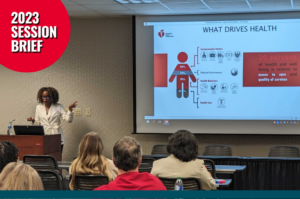By Karmen Morrison
 Your race and neighborhood can determine how long you will live.
Your race and neighborhood can determine how long you will live.
American Heart Association vice president of health strategies Shana Scott is exploring ways cross-sector collaboration can eliminate these types of health inequities.
A person’s health is impacted by many factors that are outside of their control, but some of the most common strategies to address inequities focus on changing healthcare, said Scott.
“Yes, we need to make changes in our healthcare system, but that is not the only or sole driving factor. The ZIP code and your race shouldn’t determine how long you live, but they in fact do,” said Scott, during a presentation at the State of the Public Health conference on Oct. 26 at the University of Georgia.
Health equity means everyone has equal opportunity to be as healthy as possible. Money and resources such as transportation and healthy grocery store options are pivotal when thinking about access. However, around 1 in 8 Georgians face food insecurity, according to the Atlanta Community Food Bank.
“Access is a big thing because if I don’t have employment, then I might not be able to have health insurance, and if I don’t have health insurance, I can’t get my numbers checked,” Scott said. “Access sort of snowballs into a lot of different things.”
Cross-sector collaboration is the idea of partnerships between multiple groups and organizations working together to create structural or procedural changes in public health.
Scott focused on a “health-in-all-policies” approach. This model uses cross-sector collaboration and considers social and environmental factors to create and implement policies. There are five elements to a health-in-all-policies model: promote health equity and sustainability, support intersectoral collaboration, multiple partners benefit, engage stakeholders and implementation of the policy.
“With health-in-all-policies it really just encourages community sectors to get involved and create decisions around the policy making,” Scott said.
She uses this approach in her work with the American Heart Association, and they are currently addressing hunger relief in metro Atlanta. The plan is focused on older low-income residents having a healthy diet and all metro Atlanta residents having access to healthy food options.
“We as public health cannot do it alone,” Scott said. “There’s a process to bring others along to be able to make that change, and that process is through the health-in-all-policies approach.”
